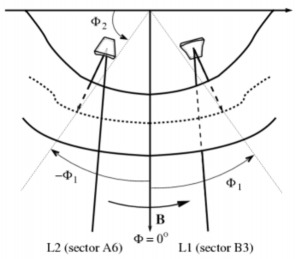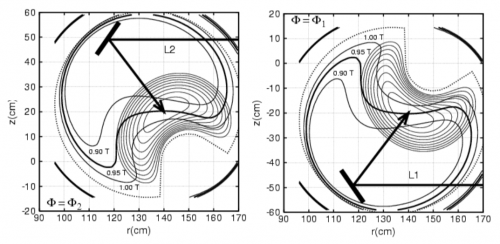TJ-II:Electron Cyclotron Resonant Heating: Difference between revisions
Jump to navigation
Jump to search
No edit summary |
No edit summary |
||
| (18 intermediate revisions by 2 users not shown) | |||
| Line 1: | Line 1: | ||
In the TJ-II stellarator, the plasmas are created and heated by two 53.2 GHz gyrotrons, each of them delivering 300 kW. The power is transmitted to the plasma by two quasi-optical transmission lines (QTL1 and QTL2). | [[File:Beamlines_1.png|300px|thumb|right|Top view of the TJ-II plasma and the injection locations of the two beam lines]] | ||
[[File:Beamlines_2.png|500px|thumb|right|Cross sections for the two beam lines, showing the steerable mirrors]] | |||
In the [[TJ-II]] stellarator, the plasmas are created and heated by two 53.2 GHz gyrotrons, each of them delivering up to 300 kW in the 2<sup>nd</sup> harmonic, with X-mode polarisation. | |||
<ref>F. Castejón and J. Guasp, ''Microwave injection in heliac device TJ-II'', [[doi:10.1088/0741-3335/30/7/008|Plasma Phys. Control. Fusion '''30''' (1988) 907-911]]</ref> | |||
The power is transmitted to the plasma by two quasi-optical transmission lines (QTL1 and QTL2). | |||
<ref>A. Fernández et al, ''Quasioptical Transmission Lines for ECRH at TJ-II Stellarator'', [[doi:10.1023/A:1006720117520|International Journal of Infrared and Millimeter Waves '''21''', 12 (2000) 1945-1957]]</ref> | |||
The power is delivered to the [[TJ-II:Sectors|sector]] B3 (for QTL1) and A6 (for QTL2). | The power is delivered to the [[TJ-II:Sectors|sector]] B3 (for QTL1) and A6 (for QTL2). | ||
The last mirror of each line is a steerable mirror located inside the vacuum vessel, which allows for perpendicular and oblique injection. | The last mirror of each line is a steerable mirror located inside the [[TJ-II:Vacuum system|vacuum vessel]], which allows for perpendicular and oblique injection. | ||
<ref> | <ref>A. Fernández et al, ''Design of the upgraded TJ-II quasi-optical transmission line'', [[doi:10.1109/ICIMW.2000.892950|Conference Digest, 25<sup>th</sup> International Conference on Infrared and Millimeter Waves (2000) 91 - 92]]</ref> | ||
<ref>[http://ieeexplore.ieee.org/xpl/freeabs_all.jsp?tp=&arnumber=4516800&isnumber=4516365 | <ref>A. Fernandez et al, ''EC waves polarization control in the TJ-II stellarator'', [http://ieeexplore.ieee.org/xpl/freeabs_all.jsp?tp=&arnumber=4516800&isnumber=4516365 Joint 32<sup>nd</sup> International Conference on Infrared and Millimeter Waves (2007)]</ref> | ||
<ref>A. Fernández et al, ''Gyrotron Radiation Affected by a Controlled Modulated Reflector: High Power Experiment'', [[doi:10.1007/s10762-007-9256-2|International Journal of Infrared and Millimeter Waves '''28''', 9 (2007) 705-711]]</ref> | |||
The | <ref>A. Fernández et al, ''Performance of the TJ-II ECRH system with the new −80 kV 50 A high voltage power supply'', [[doi:10.1016/j.fusengdes.2008.12.092|Fusion Engineering and Design '''84''', Issues 2-6 (2009) 772-775]]</ref> | ||
<ref>J. Martínez-Fernández et al, ''High power characterisation of the ECRH transmission lines and power deposition calculations in the TJ-II stellarator'', [[doi:10.1016/j.fusengdes.2020.112065|Fusion Engineering and Design '''161''' (2020) 112065]]</ref> | |||
The gyrotrons can be modulated for perturbative transport experiments <ref>S. Eguilior et al, ''Heat wave experiments on TJ-II flexible heliac'', [[doi:10.1088/0741-3335/45/2/303|Plasma Phys. Control. Fusion '''45''' (2003) 105–120]]</ref> and can be used to drive current. | |||
<ref>V. Tribaldos et al, ''Electron cyclotron heating and current drive in the TJ-II stellarator'', [[doi:10.1088/0741-3335/40/12/010|Plasma Phys. Control. Fusion '''40''' (1998) 2113]]</ref> | |||
== Signal names in the [[TJ-II:Shot database|TJ-II database]] == | |||
* GR, GR2: gyrotrons 1 and 2 | |||
* ECA1...4: sniffer probes | |||
== References == | == References == | ||
<references /> | <references /> | ||
Latest revision as of 08:20, 15 November 2025


In the TJ-II stellarator, the plasmas are created and heated by two 53.2 GHz gyrotrons, each of them delivering up to 300 kW in the 2nd harmonic, with X-mode polarisation. [1] The power is transmitted to the plasma by two quasi-optical transmission lines (QTL1 and QTL2). [2] The power is delivered to the sector B3 (for QTL1) and A6 (for QTL2). The last mirror of each line is a steerable mirror located inside the vacuum vessel, which allows for perpendicular and oblique injection. [3] [4] [5] [6] [7] The gyrotrons can be modulated for perturbative transport experiments [8] and can be used to drive current. [9]
Signal names in the TJ-II database
- GR, GR2: gyrotrons 1 and 2
- ECA1...4: sniffer probes
References
- ↑ F. Castejón and J. Guasp, Microwave injection in heliac device TJ-II, Plasma Phys. Control. Fusion 30 (1988) 907-911
- ↑ A. Fernández et al, Quasioptical Transmission Lines for ECRH at TJ-II Stellarator, International Journal of Infrared and Millimeter Waves 21, 12 (2000) 1945-1957
- ↑ A. Fernández et al, Design of the upgraded TJ-II quasi-optical transmission line, Conference Digest, 25th International Conference on Infrared and Millimeter Waves (2000) 91 - 92
- ↑ A. Fernandez et al, EC waves polarization control in the TJ-II stellarator, Joint 32nd International Conference on Infrared and Millimeter Waves (2007)
- ↑ A. Fernández et al, Gyrotron Radiation Affected by a Controlled Modulated Reflector: High Power Experiment, International Journal of Infrared and Millimeter Waves 28, 9 (2007) 705-711
- ↑ A. Fernández et al, Performance of the TJ-II ECRH system with the new −80 kV 50 A high voltage power supply, Fusion Engineering and Design 84, Issues 2-6 (2009) 772-775
- ↑ J. Martínez-Fernández et al, High power characterisation of the ECRH transmission lines and power deposition calculations in the TJ-II stellarator, Fusion Engineering and Design 161 (2020) 112065
- ↑ S. Eguilior et al, Heat wave experiments on TJ-II flexible heliac, Plasma Phys. Control. Fusion 45 (2003) 105–120
- ↑ V. Tribaldos et al, Electron cyclotron heating and current drive in the TJ-II stellarator, Plasma Phys. Control. Fusion 40 (1998) 2113